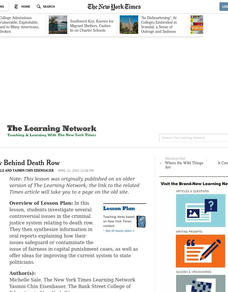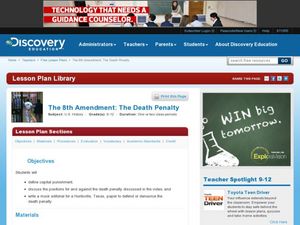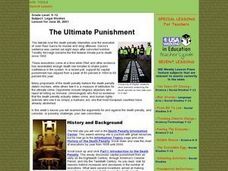Curated OER
Children's Accountability for Their Crimes
Students participate in a round-table discussion about the juvenile justice system and investigate the 'age of accountability' debate. They write a persuasive essay supporting or refuting the punishment received by the children discussed...
Judicial Learning Center
Types of Court Cases
How can one court acquit someone of a crime, while another convicts the person of the same one? It's all because of the differences between civil and criminal trials. An informative resource provides scholars in the field of criminology...
Judicial Learning Center
State Courts vs. Federal Courts
Popular culture often portrays the Feds as the most fearsome of law enforcement agencies. Yet, someone charged with a crime is considerably more likely to end up in a state court. The lesson, one of six covering the Organization of the...
Curated OER
White Collar Crime
Learners discuss difference between crimes of deceit versus crimes of violence, define white-collar crime, and examine far reach of white collar crime laws. Students then analyze what differences exist between rationales for punishing...
Curated OER
Crimes from Mother Goose
Students use Nursery rhymes in a discussion of crimes and criminals in order to study how criminal law has developed and changed to maintain an organized society. They decide on the identity of criminals, the crime, and the name of the...
Curated OER
The Candy Thief
Students research crimes and corresponding punishments of students. They interview local judges to see if they try to match the punishment with the crime. Students write an analysis article about crimes and their punishments in your...
Curated OER
Shame on You!
Should public humiliation be an acceptable consequence for a crime? Have your middle schoolers engage in a round table discussion about the recent resurgence of the use of public humiliation as a punishment for crimes in the United...
Road to Grammar
Capital Punishment
Hold a brief discussion about the death penalty with your English language learners. The resource includes vocabulary words to examine, three different viewpoints for students to consider, and a list of discussion questions. The resource...
Curated OER
Crime Vocabulary Exercise
In this English vocabulary skills worksheet, students respond to 12 multiple choice and 6 fill in the blank questions regarding words related to crime.
Curated OER
The Language Of Crime Newspaper Reporting
In this language of crime reporting learning exercise, students read, write and discuss newspaper reports about crime, using fill ins, matching, and a crossword puzzle with notes for the teacher and an answer sheet.
Curated OER
Who Decides Who Dies?
Young scholars explore various state laws concerning capital punishment and conduct a mock meeting of the United States Congress to set standards for the death penalty.
Curated OER
The Row Behind Death Row
Students investigate several controversial issues in the criminal justice system relating to death row and give oral reports explaining how their issues safeguard or contaminate the issue of fairness in capital punishment. They offer...
Curated OER
The 8th Amendment: The Death Penalty
High schoolers take a closer look at the death penalty. For this U.S. government lesson, students watch a Discovery video about capital punishment in the United States and then compose letters to the editors of newspapers about their...
Curated OER
The Candy Thief
Students research what kind of punishments local judges give for these. Students research what kind of punishments other judges elsewhere might give. Students report their findings to the class and perhaps to local judges or another...
Curated OER
Parents Hand Out Unusual Punishments
Students discuss how they are disciplined at home, then read a news article about some unusual punishments given to children. In this current events lesson, the teacher introduces the article with a discussion and vocabulary activity,...
Curated OER
Do We Need a Permanenet International Criminal Court?: War Crimes, Violence, International Law and Politics, Nuremberg
In this lesson, students explore the history, relevance and current application of international tribunals for war crimes. Students look at cases from the Nuremberg trials, Tokyo trials and the Bosnian War.
Curated OER
Knife crime and sentencing
Students discuss their feelings about kids carrying knives and whether or no people who carry knives should be punished just as much as people who carry guns. Students study what a fixed penalty is, the dangers of kids carrying knives,...
Curated OER
The Ultimate Punishment
Students discover information about the death penalty debate. They explore the history of the death penalty and how it has changed over time. They examine supporting and opposing viewpoints of the issue.
Curated OER
Race and Crime in the United States: Are We Victims of Discrimination or Antiheroes?
Using methods adopted by Public Policy Analysts (PPA) class groups define a social problem, gather evidence to document the existence of the problem, identify causes, evaluate existing policies designed to deal with the problem, develop...
Facing History and Ourselves
Justice After the Holocaust
Though there could be no true justice for the horrors of the Holocaust, many of those responsible for crimes against humanity were found guilty in the eyes of the law. Using primary and secondary sources in the 16th installment of a...
EngageNY
Grade 9 ELA Module 2, Unit 2, Lesson 18
The punishment must fit the crime, even for a king. Sophocles' Oedipus the King meets its grisly end with a lesson that focuses on the conclusion of the play and Oedipus' self-assigned punishment. Learners connect the symbolism of his...
University of Southern California
Deconstructing Genocide: The Ultimate Crime Against Humanity
There are eight stages of an atrocity known as genocide, and it's important to understand how they are represented so we can fight against it in the future. As young historians watch video clips of ten Jewish Holocaust survivors'...
Judicial Learning Center
Your 4th Amendment Rights
Americans love to learn about their rights, especially those that protect them from the government's power to invade their privacy. Young people are especially engaged by this topic. An informative lesson explores four Supreme Court...
Judicial Learning Center
The Players in the Courtroom
Courtrooms are complicated. In addition to the many rules, there are a number of people whose jobs are not very clear to the casual courtroom observer. With the resource, individuals identify some of these roles and review more...

























